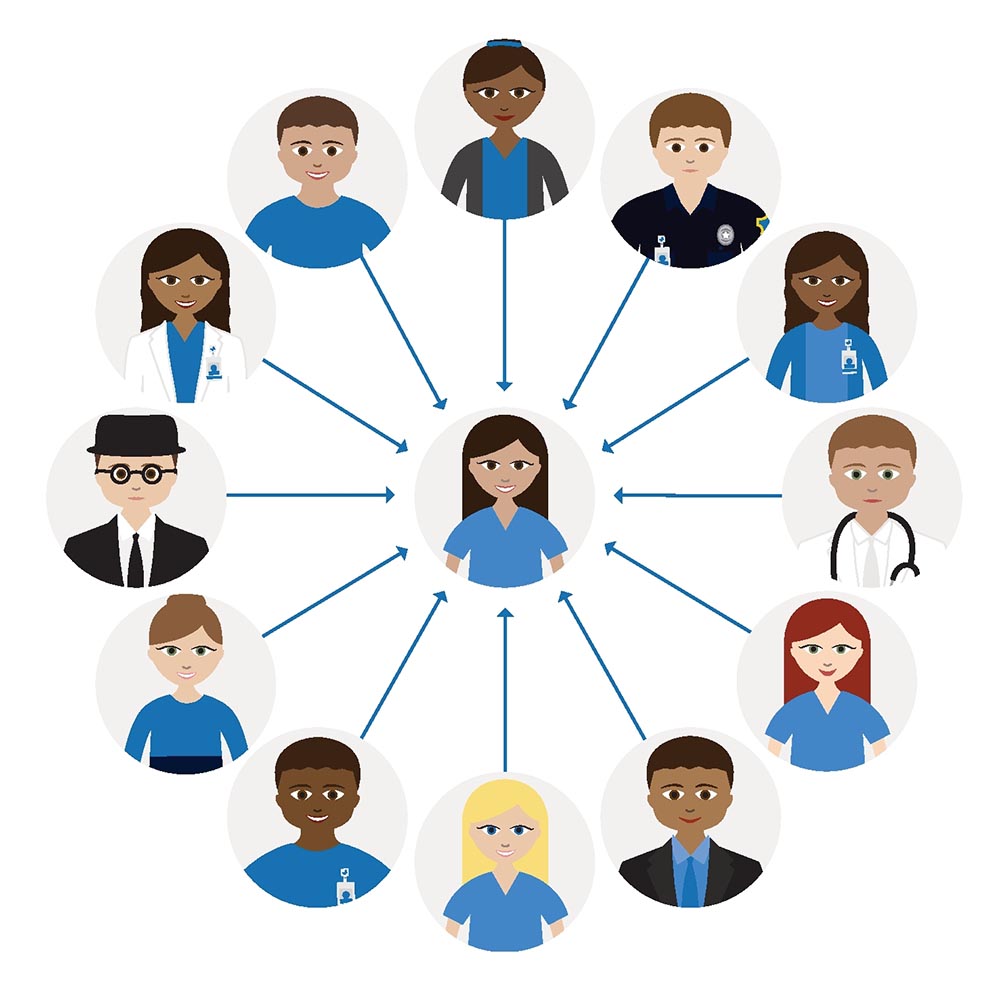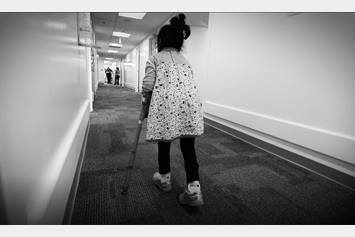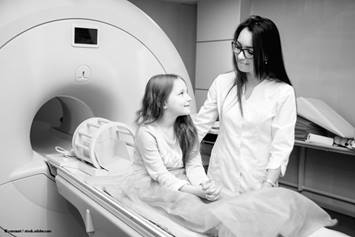Movement Disorders Clinic
Diagnosing and Treating Movement Disorders in Children and Young Adults
Movement Disorders Clinic
The Movement Disorders Clinic at Nationwide Children’s specializes in helping infants, children and young adults with common or complex movement problems. Movement disorders are conditions that affect the nervous system (neurological), which includes the brain, spinal cord and nerves.
Movement disorders can cause increased, reduced or slow movements. These movements may be ones the body can control (voluntary) or movements the body can't control (involuntary), such as tics, tremors, muscle contractions or other abnormal movements.
Children or young people with movement disorders may also have other health issues. These can include mental health conditions, learning challenges, seizures and sleep problems. That's why it is important to treat the whole child. Children's bodies and minds are growing and developing. Their needs aren't the same as adults. No one understands this better than the pediatric specialists at Nationwide Children's. If you think your child should be seen in the Movement Disorders Clinic, contact your child's doctor to get a referral to our clinic.

Neurology is a top 10 specialty according to U.S. News and World Report.
What Conditions Are Considered Pediatric Movement Disorders?
Movement disorders begin in the brain and affect the nervous system. A movement disorder can cause a child to move too much or too little. It can cause problems with balance and coordination or can include tremors or tics. We understand how frightening this can be. Our team is here to help. It takes a team of health care experts from many specialties to provide the most thorough care for your child.
Parents and caregivers are equally important in the treatment process. No one knows your child better than you do. We make sure you understand the diagnosis and how we plan to treat your child. Working together provides the best outcomes for our patients and families. Caring for kids is all we do, and what we do best.
What Causes a Movement Disorder?
There are different kinds of movement disorders and different causes for them. Some are more severe than others. All affect how well and how easily children move. Some causes of movement disorders in children include:
- Brain injuries
- Genetic changes (either inherited from parents or happened suddenly or spontaneously)
- Medication side effects
- Infection
- Disease or Illness
Movement disorders must be diagnosed by a qualified health care professional. If you think your child may have a movement disorder, talk to their pediatrician about a referral to our clinic.
Movement Disorder Clinic Testing and Treatment
Movement disorders are often accompanied by additional problems, such as ADHD, obsessive-compulsive disorder (OCD)/obsessive-compulsive symptoms (OCS), anxiety, depression, learning problems, headache and sleep problems. That's why it's important to work with other medical specialties to make sure we have a complete picture of your child's health care needs.
The team will gather your child's medical history from referring providers and through communication with patient and parent. We also observe patients closely under different conditions and performing different activities. Video recordings taken in the clinic and sometimes those taken by parents are also helpful in diagnosis. Your child receives a complete neurological exam and may have additional testing.
Your child will have seamless care across every service. You will have the peace of mind knowing your child is getting the care they need. It's just that simple.
Common Movement Disorder Testing
Depending on initial observations and patient history, further testing may include:
- Magnetic resonance imaging (MRI) of the brain
- Electroencephalography (EEG)
- Other electrophysiological studies:
- Nerve conduction (NCS)
- Electromyography (EMG)
- Evoked Potential (EP)
- Metabolic testing
- Genetic tests
- Thyroid profile
- Tissue biopsies and culture
- Immunological studies
Treatments for Movement Disorders
Treatment options generally involve medication management with close attention to the specific disorder to ensure the best outcome. When appropriate, treatment may involve additional measures, including botulinum toxin injections, deep brain stimulation and other surgical interventions like intrathecal baclofen pump. Your medical team will determine which treatment is best for your child's needs. Talk to your child's doctor about a referral to the Movement Disorders Clinic.
Meet the Movement Disorders Clinic Team
It's not just who treats your child that makes a difference at Nationwide Children's. It's how your child is treated here. Helping children and teens feel better is our purpose and what drives us each day. It's why we do what we do. From evaluation to treatment to recovery and beyond, a team of specialty experts is required to ensure the best outcome.
Your child's care will be led by a pediatric movement disorder specialist. The team may also include neurologists, physical therapists, nurse practitioners, nurses and other specialty physicians based on your child's diagnosis and treatment needs.
Featured Provider

Toni S. Pearson
Dr. Toni Pearson, MBBS, specializes in childhood movement disorders and evaluates patients with dystonia, chorea, parkinsonism, ataxia, myoclonus, tremor, tics and spasticity. She also works in collaboration with the Comprehensive Cerebral Palsy Program at Nationwide Children’s.
Members of the Movement Disorders care team represent a variety of medical specialties, all working closely to diagnose and treat patients. They include:
Do you need to speak with someone? Contact your child's pediatrician to get started, or contact Neurology at (614) 722-4625.
Why Choose the Movement Disorders Clinic at Nationwide Children's?
Pediatric movement disorders are complex. They require specialized care as children's bodies and brains develop. Nationwide Children's has one of the few pediatric movement disorders clinics in the U.S. Staffed with a specially trained pediatric movement disorders neurologist, this subspecialty focuses on treating infants, children and adolescents.
Members of the Movement Disorders care team represent a variety of medical disciplines, all working closely to diagnose and treat patients. Because all of our specialists are located on the same campus, you'll have access to everyone in one trip.
Nationwide Children's Hospital is ranked by U.S. News & World Report for Neurology and Neurosurgery.

Leading the Way to New Treatments and Outcomes Through Clinical Research

Clinical care and research work together. This helps scientists and doctors to find new treatments and therapies. Clinical studies (also called clinical trials) done at the Abigail Wexner Research Institute will continue to become more common in daily care at Nationwide Children's. Clinical studies help doctors learn more about conditions and treatment.
This means you might hear about a clinical study that your child might be able to join. This does not mean that your child has to join a study. You always have the choice about whether or not to join a study.
Becoming a Movement Disorders Clinic Patient
Patients must have a physician referral to be seen in the Movement Disorders Clinic. If you think this clinic could help your child, ask your pediatrician or health care specialist to make a referral online, by phone or fax.
- Complete our online Request An Appointment form
- Call Central Scheduling at (614) 682-2495 or 1 (888) 514-0430
- Download and fax a referral request to (614) 722-4000
What Happens After Your Doctor Refers Your Child?
Once we receive the referral, we will mail you a packet of paperwork. Please complete and mail or email this information to our clinic as soon as possible. You will be notified once your intake paperwork has been reviewed.
Movement Disorders and Conditions We Treat
- Ataxia
- Athetosis
- Ballismus
- Bradykinesia
- Cerebral Palsies With Abnormal Movements
- Chorea
- Dyskinesia
- Dystonia
- Genetic and Metabolic Disorders Producing Involuntary Movements
- Huntington Disease
- Myoclonus
- Parkinsonism
- Psychogenic Movement Disorders
- Spasticity
- Stereotypies
- Tic Disorders (Transient, Chronic, Tourette Syndrome)
- Tremors




